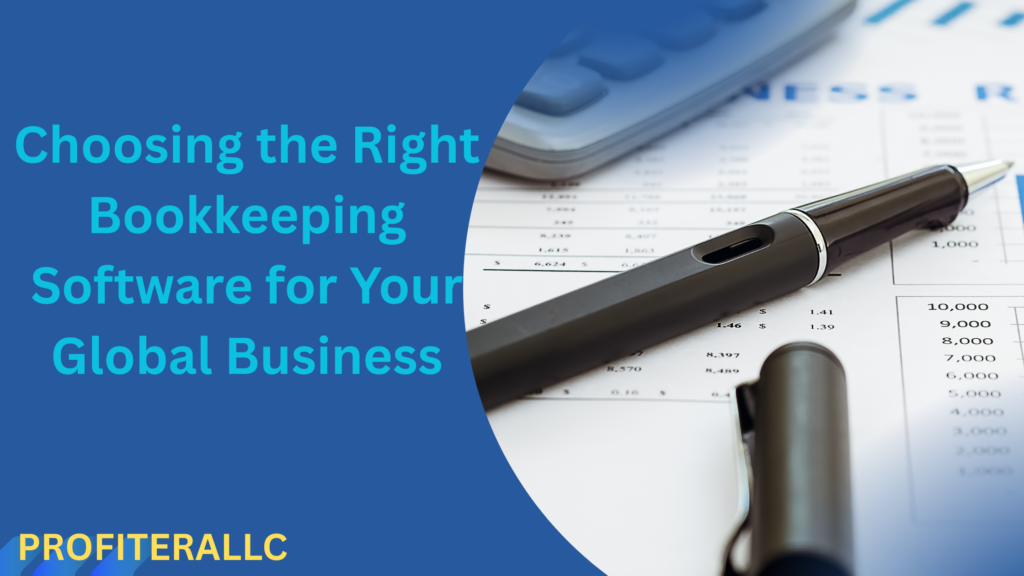
Introduction
Running a global business requires more than just a strong product or service; it demands meticulous financial management that adapts to varying regulations, currencies, and operational complexities. Bookkeeping is the backbone of financial transparency and decision-making, and choosing the right bookkeeping software for global business operations is critical.
With a vast array of tools available on the market, how do you decide which one fits your needs? In this guide, we’ll walk you through what to look for in global bookkeeping software, explore top tools, and help you make a confident, informed choice.
Why Global Businesses Need Specialized Bookkeeping Software
Operating internationally introduces complexities like:
- Multiple currencies and exchange rates
- Diverse tax regulations
- Remote teams and time zones
- Local compliance laws
- Multiple entity consolidations
Traditional bookkeeping software may not handle these efficiently, which is why you need a solution tailored for international scalability and compliance.
Key Features to Look for in Global Bookkeeping Software
When selecting a bookkeeping solution for international operations, prioritize the following features:
1. Multi-Currency Support
Choose software that automatically updates exchange rates and allows you to invoice and accept payments in multiple currencies.
2. Tax Compliance & Localization
Your software must comply with tax regulations in all countries where you operate. Features like VAT support, local tax calculations, and region-specific invoicing are critical.
3. Cloud Accessibility
Cloud-based solutions allow real-time access from anywhere in the world—ideal for distributed teams and global finance operations.
4. Integration Capabilities
Your bookkeeping software should integrate seamlessly with other tools like payroll, CRMs, ecommerce platforms, and ERP systems.
5. Multi-Entity Management
If your business operates in different regions with separate entities, choose software that allows you to manage and consolidate books for each.
6. Automation and AI
Look for features like automated bank reconciliation, recurring invoices, smart categorization, and expense tracking.
7. Security & Data Protection
Ensure the software complies with global security standards (GDPR, SOC2, etc.) to protect sensitive financial data.
Top Bookkeeping Software Options for Global Businesses
Below are some of the most reliable and widely used bookkeeping software platforms designed to support international operations.
1. Xero
- Pros: Strong multi-currency support, over 800 app integrations, cloud-based, user-friendly interface
- Best for: Small to mid-sized global businesses
- Limitations: Limited advanced inventory management
2. QuickBooks Online Advanced
- Pros: Robust reporting, payroll integrations, advanced invoicing, multi-currency support
- Best for: Businesses with growing operations
- Limitations: Tax compliance features vary by country
3. Zoho Books
- Pros: Affordable, automation features, VAT/GST compliance for multiple countries
- Best for: Budget-conscious global startups
- Limitations: Limited integrations compared to Xero or QuickBooks
4. NetSuite by Oracle
- Pros: Enterprise-level capabilities, customizable, supports global compliance and consolidation
- Best for: Large enterprises and fast-growing businesses
- Limitations: High cost and longer implementation time
5. Wave (for very small global businesses)
- Pros: Free for accounting and invoicing, good for freelancers and micro-businesses
- Best for: Startups and solopreneurs operating internationally
- Limitations: Not scalable for complex operations
Questions to Ask Before Choosing Your Bookkeeping Software
Here’s a checklist of critical questions to evaluate before investing:
- Does it support all the countries where I operate?
- Can I consolidate reports across different entities?
- Is it compliant with local tax and financial regulations?
- How easily can I onboard international staff or bookkeepers?
- Does it provide automation that reduces manual data entry?
- How does it handle multi-currency and multi-language needs?
- Is customer support available 24/7 and in multiple languages?
Cost Considerations
Pricing models for global bookkeeping software vary based on:
- Number of users
- Number of entities or regions supported
- Features (multi-currency, automation, integrations)
- Support options (email, live chat, phone)
- Level of customization
Always consider the total cost of ownership—including hidden fees like setup, training, or extra users—before making your decision.
Integration with Other Business Tools
Your bookkeeping software should act as the financial hub of your business and must integrate smoothly with tools like:
- Payroll: Gusto, ADP, Paychex
- E-commerce: Shopify, WooCommerce, BigCommerce
- CRM: Salesforce, HubSpot
- Banking: Multi-currency banks and payment gateways (Wise, PayPal, Stripe)
- Inventory Management: Cin7, Unleashed, TradeGecko
The more integrated your ecosystem, the less manual work and data entry you’ll have to do—leading to better accuracy and faster decisions.
Real-World Case Study
Case Study: Global E-Commerce Brand
A U.S.-based e-commerce company expanded to Europe and Asia. Initially using basic accounting software, they faced issues with:
- Managing VAT in the EU
- Converting sales across 6 currencies
- Delayed monthly closings
After switching to Xero integrated with Avalara for tax compliance and Shopify for e-commerce, they:
- Reduced manual tax adjustments by 90%
- Closed books 5 days faster
- Improved financial forecasting accuracy
This transformation showcases the ROI of choosing scalable, integrated bookkeeping software.
Common Mistakes to Avoid
Avoid these pitfalls when selecting your software:
- Choosing only based on price: Cheap software often lacks features needed for international compliance.
- Ignoring scalability: You’ll outgrow basic tools faster than expected.
- Overlooking tax compliance: Not having VAT/GST support can cause costly errors.
- Delaying migration: Transitioning to the right tool gets harder as you scale.
Steps to Implement the Right Bookkeeping Software
- Audit your current financial processes
- List required features and integrations
- Shortlist 3–5 options based on features
- Schedule demos and trials
- Consult with your accountant or CFO
- Plan a phased rollout
- Train your team
- Monitor performance and iterate
Conclusion
The right bookkeeping software for global business operations can be the difference between financial chaos and clarity. With multi-currency, tax compliance, and integration at the core, the right tool supports your company’s growth across borders.
Take time to evaluate your needs, compare leading platforms, and make a decision that prepares your finances for scale and compliance. The investment today will save countless hours and dollars tomorrow.
FAQs
Q1. What is the best bookkeeping software for international e-commerce businesses?
A: Xero or QuickBooks Online paired with e-commerce integrations like Shopify or Amazon are ideal.
Q2. Can I manage multiple companies from one bookkeeping account?
A: Yes, but choose software that supports multi-entity management like NetSuite or QuickBooks Advanced.
Q3. Do I need different software for each country?
A: Not necessarily. Many global bookkeeping solutions support localization features within a single account.
Q4. What’s the best software for freelancers working with international clients?
A: Wave or Zoho Books are great free or low-cost options with multi-currency support.
Q5. How do I ensure data privacy in cloud bookkeeping tools?
A: Choose providers that follow international standards like GDPR, SOC2, and offer end-to-end encryption.






